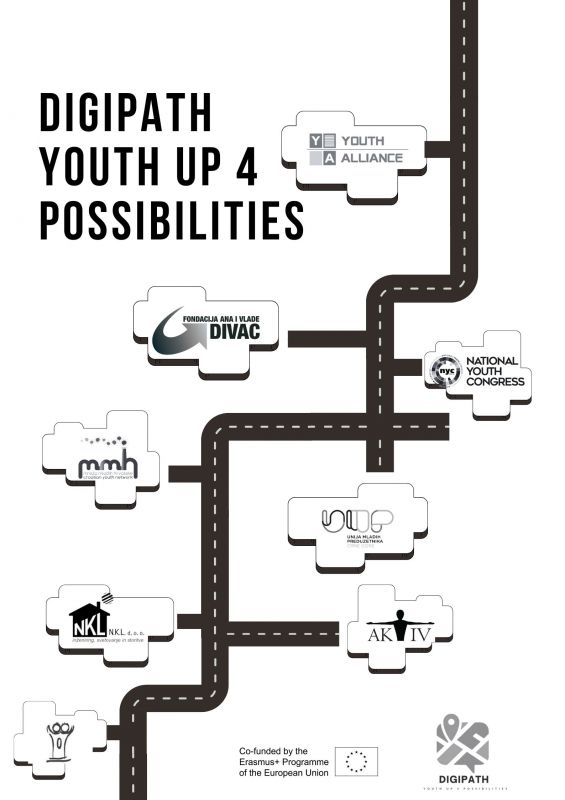“DigiPath - Youth Up 4 Possibilities” addresses youth unemployment by enabling shared digital youth work in Albania, Bosnia and Herzegovina, Montenegro, North Macedonia, Kosovo, Serbia, Croatia and Slovenia.
Unsustainable youth brain drain is a big risk. Trends show young people migrating from WB6 economies, to Croatia and Slovenia, there is a lack of shared data on flows and quality opportunities. Four urgent concerns contribute to young people living in precarious conditions: unemployment, repercussions of the COVID-19 pandemic, sluggish transition to digital youth work, and absence of inter-sectoral collaboration. In the 24-month project, partners will collaborate to develop a digital tool that connects education, labor market and the youth sector to each other and young people. Enabling visibility about decent personal and professional development opportunities in home and destination countries.
The concrete, tangible product from this project would be a DIGITAL PLATFORM that will connect three crucial sectors for enhancing youth employment: the educational sector (universities, faculties, institutes, and other higher education institutions), the labor market and the civic youth organizations sector, all as opportunities providers.
Objectives
- Enhance capacities of 8 youth organizations in inter-sectorial cooperation with education and the labor market;
- Support the digital transition and increase competences in digital youth work;
- Enable participating organizations to co-deliver sustainable projects supporting youth future prospects;
- Create a digital tool, DIGITAL PLATFORM, enabling cooperation between sectors, youth participation and strengthening cooperation in WB6 economies, Croatia and Slovenia;
- Setting a circular framework of youth empowerment.
Key Achievements
- Case study and evidence: Based on national reports from North Macedonia, Serbia, Albania, Kosovo, Croatia, Bosnia and Herzegovina, Montenegro, and Slovenia, the project generated robust evidence through 8 online surveys per country, 79 in-depth interviews, and 10 focus-group sessions per country. The research also included 8 analyses of relevant legal frameworks, 8 compilations and interpretations of statistical data (8 datasets - one per country), and 8 reviews of national policy documents.
- Capacity building in the field of youth: All 8 partner organizations reported enhanced capacities in inter-sectoral cooperation with the education sector and the labour market. Over 90% of staff members, including youth workers and leaders involved in the project, reported increased proficiency in using digital tools and platforms to strengthen youth participation, learning pathways, and overall well-being. These results demonstrate a measurable improvement in digital youth work capacities and directly support the EU’s digital transformation agenda.
- Final output: A DIGITAL PLATFORM published in all 8 national languages, ensuring broad accessibility and regional relevance.
- Visibility and engagement: The project reached over 10,000 people through media coverage, conferences, and info days, engaging more than 200 stakeholders from government institutions, academia, the business sector, and civil society.
- Regional cooperation: The consortium jointly developed 5 new project proposals aimed at further strengthening cooperation between Programme and Partner countries. Building on lessons learned, these initiatives establish a solid foundation for future collaborative youth actions and ensure continuity of cooperation beyond the project’s lifetime.
Main results and outputs:
- Study visit I, 22-27.04.2024., Zagreb, Croatia
- Study visit II, 03-08.06.2024., Belgrade, Serbia
- International Youth Conference, 26-30.09.2024., Krushevo, North Macedonia
- Case study report
- Digital platform - www.digipath4eu.org
- International Youth Conference, 26-28.09.2025., Krushevo, North Macedonia
- Podcast- Youth in the neighborhood
The project is implemented by:
Ana and Vlade Divac Foundation (Serbia)
Unija Mladih Preduzetnika Crne Gore (Montenegro)
PRONI (Bosnia and Herzegovina)
Youth Alliance (North Macedonia)
AKTIV (Kosovo)
National Youth Congress (Albania)
Croatian Youth Network (Croatia)
N.K.L. INZINERING (Slovenia)
The project is co-funded by the Erasmus Plus Programme of the European Commission.
